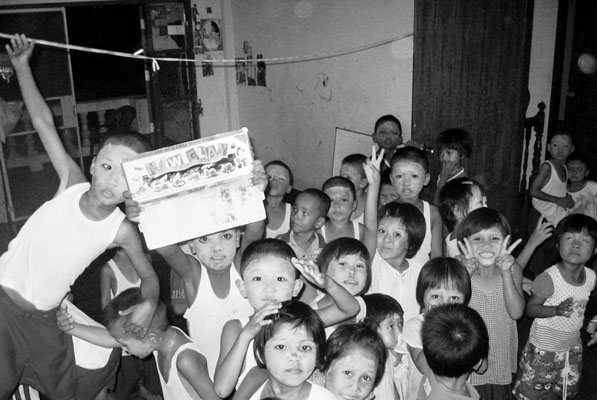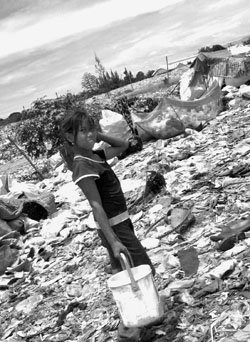No Country to Call Their Own

Stateless Burmese children in Thailand are still being denied basic rights such as access to education and health services, and they are vulnerable to many kinds of exploitation and abuse, according to migrant rights advocates.
It’s estimated that there are about 1 million stateless children in Thailand, with about two-thirds thought to be children of Burmese migrant workers who come in search of a better life.
 |
| this girl had to drop out of school to help support her family by collecting and selling plastic bags. (Photo: Thawdar/The Irrawaddy) |
“Efforts are underway to ensure that the system is accessible and well known to parents, including stateless parents, local officials and communities,” said Amanda Bissex, chief of the Child Protection Section of UNICEF Thailand.
Under the revised law, the Thai government, which ratified the 1989 Convention on the Rights of the Child (CRC), has instructed all state hospitals to issue birth registration documents to any baby born to any parents, regardless of their background.
However, rights advocates say that in practice, hospitals often fail to issue birth certificates to the children of migrants. This is partly due to the fact that many parents simply don’t ask for these documents because they don’t realize how important they are for their children’s futures.
Another problem is that many unregistered Burmese migrant women are afraid to go to state hospitals to give birth, as they fear arrest and deportation. As a result, they deliver their children at their homes or worksites with the help of local midwives.
Unregistered migrants’ constant fear of arbitrary arrest and deportation also discourages them from taking their children to local health-care facilities, causing them to miss basic inoculations against crippling diseases such as polio.
Pockets of the education system also remain largely inaccessible to many stateless children, say advocates. According to the Peace Way Foundation in Thailand, in some areas a migrant child can only be educated if a teacher is willing to accept the child and the family can afford it. Some children can attend classes, but with little hope of obtaining a Thai certificate of education, which is essential for further study.
In 2005, the government adopted a policy called “Education for All,” which was intended to give all children in Thailand equal access to schooling. However, even Thailand’s deputy education minister, Chaiwut Bannawat, has admitted that a large number of children still fail to receive an education.
While a language barrier prevents many children from entering Thai schools, poverty forces many others to forego study so they can work to support their families. The inability to get Thai certificates of education is another reason that few Burmese children continue their education when they migrate to Thailand with their families.
A very small percentage of stateless children are able to further their studies in Thai schools and go on to foreign countries on scholarship programs. For the rest, any hope of achieving a better education is soon abandoned.
“If children see no prospect for their future, they just take any job available in their community, which does not help them towards establishing better livelihoods,” said Aye Aye Mar, the founder of Social Action for Women (SAW), an NGO that provides shelter, training, and learning centers for Burmese women and children.
Aye Aye Mar noted that many teenagers turn to employment agents to help them find better jobs in cities, which sometimes makes them vulnerable to human trafficking, exploitation and abuse.
According to Tattiya Likitwong, a project coordinator for the Child Development Foundation, the child labor situation in Thailand has not improved because many children, including stateless children from Burma, Laos and Cambodia, can still be seen working in low-paying jobs, particularly in large cities.
More than 200,000 migrant children between the ages of 15 and 18 have been registered by employers, while many more are not registered, said Tattiya. Many of the children work in the fishing industry, while others sell flowers by the roadside or beg on the streets.
1 | 2 next page »
